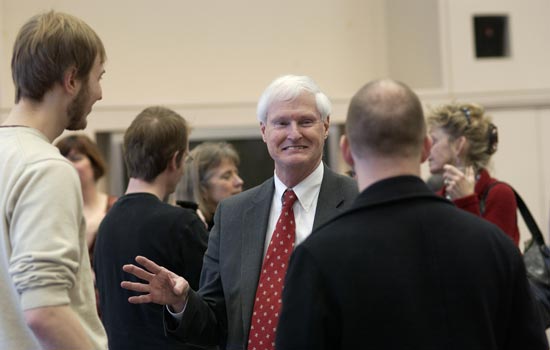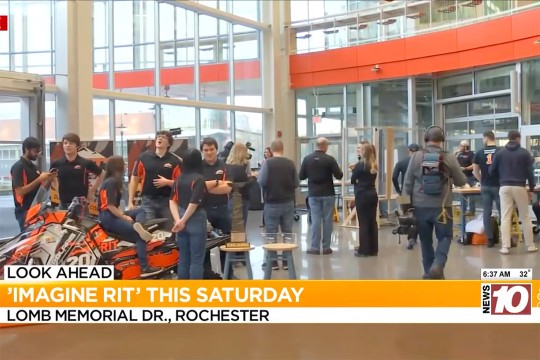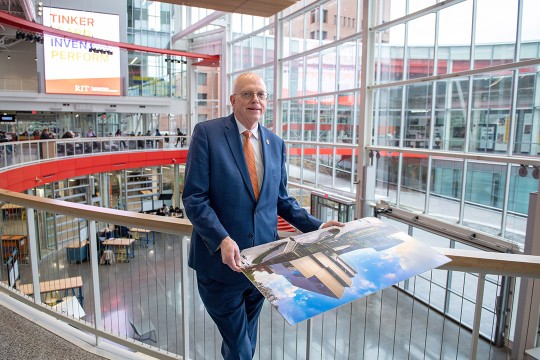William Destler named RIT president
Maryland provost praised for his academic ideas and vision
A. Sue Weisler
William Destler, selected to become RIT’s ninth president effective July 1, chats with community members, including student Erhardt Graeff, far left, following an open forum on Feb. 19.
William W. Destler has been named RIT’s ninth president. The RIT Board of Trustees made the choice at a special March session, selecting the senior vice president for academic affairs and provost of the University of Maryland at College Park from among two finalists and a pool of nearly 100 candidates. Destler will assume RIT’s top post July 1, succeeding Albert J. Simone, RIT’s president since 1992.
Vision for RIT: Taking the next steps ‘from good to great’ Destler wants to do for RIT that which he has spent a professional lifetime doing in Maryland: moving units under his direction to new levels of achievement and distinction. “This is quite a unique place,” Destler says. “It offers some opportunities, in my opinion, to be a groundbreaking institution if we have the courage to move forward together and capture the new high ground in higher education. RIT is well positioned to take that next step.” Speaking to the RIT community during a Feb. 20 open forum (one of two such forums in which he participated last month), Destler commended RIT for its unique mix of high-caliber programs in a wide range of disciplines—including those within NTID—and the promise it holds to become internationally recognized in higher education. Emphasizing these niches, Destler wants to build on Simone’s “category of one” initiative. “Take advantage of your unfair advantages,” he advocates. Moving RIT to that next level, he suggests, will begin with benchmarking the university against other high-quality institutions, identifying areas in need of improvement and addressing deficiencies. Specific steps RIT must take, he recommends, include raising its retention and graduation rates, better engaging its alumni and increasing the value of its endowment. Focusing on these priorities will, in turn, have additional benefits, Destler says, by helping raise the university’s reputation—leading to a larger pool of applicants and allowing RIT to become more selective by raising its admissions standards or increase revenue by admitting more students. “There’s nothing that helps more because that next step will make you an attractive institution of choice for students from a broader region, perhaps even internationally,” he said at the Feb. 20 forum.
Innovation, collaboration and a ‘community of learners’ Other strategies Destler envisions to put RIT “on the map” include student projects stressing innovation—similar to Maryland’s Gemstone Program, for which he receives credit for creating (see story below for more); collaborations with industry on research-and-development goals; additional strategic global partnerships; continual learning by faculty and staff, as well as students; and academic programs emphasizing cross-disciplinary cooperation—including a possible first-in-the-nation “team Ph.D.” program. “Now that would really shake up higher education,” he says of the latter idea. “These are not proposals—I’m not even sure they’re good ideas,” he quipped during the forum. “But they are conversation starters.” Earlier in his visit, he said his administrative style is to foster dialogue on areas where RIT can gain prominence nationally and internationally. In response to audience questions, Destler expressed support for the arts and humanities, and he shared his views on the value of scholarship. “When I look at a university, I see a community of learners,” he explained. “The students are here to learn, but so are the faculty and staff. In a very real sense, teaching, research and scholarship, and creative activity all together comprise the educational enterprise. I think we want a community in which everybody is learning.” Highlighting RIT’s College of Liberal Arts as the university’s largest college in terms of numbers of faculty and credit hours taught, he continued: “RIT does a wonderful job preparing people for careers, and its career orientation has earned it a fine reputation. But RIT has another responsibility, and that’s to train people to be solid, intellectual citizens. College is not just about job training. It’s about learning how to live your life in an ethical and principled way—learning how to learn, learning how to use information wisely.”
Upstate New York’s economy, support for the performing arts, and college sports Other topics Destler touched on during the open forums included the regional economy, support for the performing arts and college sports. On RIT’s impact on the regional economy: “I think RIT has to be seen increasingly as the region’s greatest asset, not just in Rochester, but in this whole upstate New York area. I think it has the potential to be the strongest economic driver in the region.” On support for the performing arts: “Institutions always tend to get a little bit out of balance, and they get weighed down by where the money is. And the money is on the science and technology and business side, for the most part. So they occasionally need to rebalance themselves or, at least, remember the need for this intellectual breadth.” On RIT sports: Destler hinted at openness to possibly evaluating the upgrade of a second team sport to Division I. The RIT men’s hockey team currently is the only Division I college sports team in Rochester.















